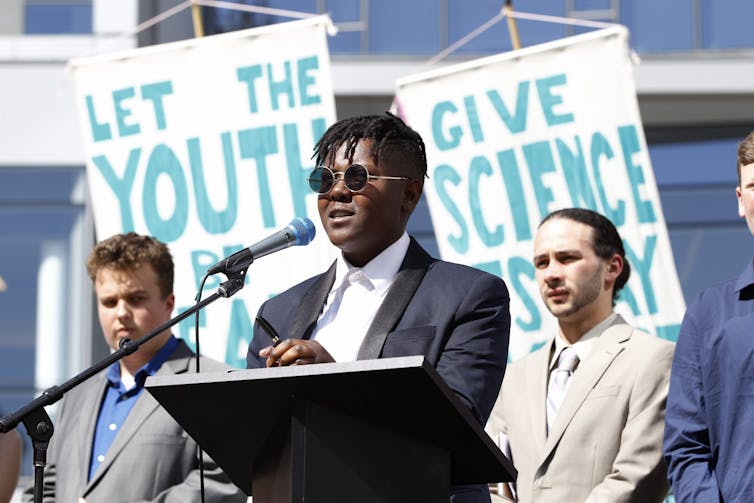Using language to make the world of fossil fuels strange and ugly: └Ž╦Š╗·ų▒▓ź expert

Published: July 19, 2019
They werenŌĆÖt getting it.
I had a room full of bright first-year university students in front of me, but confusion reigned as I tried to describe how embedded fossil fuels are in every aspect of society.
ŌĆ£OK, letŌĆÖs try this. What do you call a car that uses both gasoline and battery power?ŌĆØ Relieved to be asked a question they could confidently answer, a few students piped up: ŌĆ£Hybrid car!ŌĆØ
ŌĆ£Right. Now, what do you call a car that you plug in?ŌĆØ The number of students joining the chorus grew: ŌĆ£Electric car!ŌĆØ
ŌĆ£Right again. So, what do you call a car that runs only on gasoline?ŌĆØ The response was a bit delayed this time, but some wry smiles of understanding accompanied the answer: ŌĆ£A car.ŌĆØ
Making the invisible visible
Despite and research showing that , the fossil fuel system remains dominant, normal and even invisible.
We have cars and electricity and home heating and transportation systems and agricultural and industrial production. None of them normally have adjectives that denote their reliance on fossil fuels. That reliance is natural and therefore invisible and unspoken. Normal.
As a society, we have not made the status quo strange and the negative aspects of fossil fuel dominance visible in our language and labels: dirty, gas-powered cars; polluting, coal-fired electricity; unsustainable, oil-dependent agriculture. And we need to.
In their book , Thomas Princen, Jack Manno and Pamela Martin explore U.S. philosopher Richard RortyŌĆÖs provocative idea that major social change is in part dependent on to the problem of climate change. Making the fossil fuel world strange and negative in our thoughts, speech and labels is part of pursuing the transformation that we need to stave off the worst implications of climate change.
and scholars taught us this lesson in other realms. Language matters because it helps us to construct our reality. Adjectives or the lack thereof can signal the dominant and non-dominant entities.
If your cause or identity has to use, or is subject to, adjectives, you are often at a disadvantage. YouŌĆÖre not the norm. YouŌĆÖre not dominant. . . Such modifiers serve to marginalize.
A number of climate policy scholars are convinced that part of the transformation we need in order to address climate change is for people and societies to positively and a low-carbon life, taking for granted the fossil fuel-free world on the horizon.
Perhaps the best indication that societies are succeeding on climate change is not the or investments in , but instead the transformation of adjectives ŌĆō when descriptors like ŌĆ£renewableŌĆØ and ŌĆ£low-carbonŌĆØ become superfluous because they are the natural, normal state of energy and infrastructure.
Language as strategy
Changing our language and labels can be part of active strategies to bring about change. It may not be as dramatic as political debates and or . But this kind of language strategy could contribute to change by making the fossil fuel-dominated world visible and strange, and the low-carbon world normal.
An example of this active language work just emerged in the United Kingdom, where the : ŌĆ£BP and Royal Dutch Shell, and other U.K.-listed exploration and production companies like Cairn Energy and Tullow Oil, are now grouped in the ŌĆśnon-renewableŌĆÖ index, previously called ŌĆśoil & gas producers.ŌĆÖŌĆØ
Just in case anyone thinks this is merely a semantic change, the Financial Times story goes on to note that NorwayŌĆÖs $1 trillion sovereign wealth fund, , will use the classification to ŌĆ£ŌĆ”determine which fossil fuel companies to divest, with the changes potentially affecting the inclusion or exclusion of an oil company or security from the fundŌĆÖs blacklist.ŌĆØ
This strategy of making the fossil fuel world strange and negative must become standard as we transition to a low-carbon future.
Journalists, thought leaders and politicians all have a role to play here. They should commit to putting descriptive and even negative adjectives on things that do not normally have them ŌĆō modifiers like ŌĆ£gas-powered,ŌĆØ ŌĆ£polluting,ŌĆØ ŌĆ£high-carbonŌĆØ ŌĆō both in speech and on labels that have material impact, like the categorization of stocks on the FTSE index.

Adjectives are not magic, and they do not preclude the hard work of political change. But if imagining and speaking the world we want to see is crucial in building support and momentum for transformation, then what is visible and invisible, strange and normal, positive and negative, has to change.
I told my students I would have more hope for the prospects for avoiding climate catastrophe when ŌĆ£gas-poweredŌĆØ was necessary to modify ŌĆ£carŌĆØ because the natural state of cars had changed to electric. Changing how we think, talk and label the world weŌĆÖre in and the world weŌĆÖd like to be in is part of that transformation.![]()
is professor of political science at Scarborough and a co-director of the Environmental Governance Lab.
This article is republished from under a Creative Commons license. Read the .



